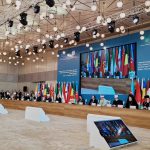TIRANA, Jan. 22, 2024 – As tensions in Kosovo and Bosnia-Herzegovina continue, and with worries of Russian meddling, there has been an increase of investment in the defense of staunchest U.S. allies in the Western Balkans — both Kosovo and NATO member Albania.
Last week, the United States approved a request from Kosovo’s government to purchase Javelins, the advanced anti-tank weapon system that has been used very effectively by Ukraine as it defends its territory from Russian aggression.
The Republic of Kosovo wants to buy 246 Javelin missiles and 24 lightweight command launch units, among several other items, the U.S. Defense Security Cooperation Agency said on Jan 11.
Despite NATO reassurances that it will defend Kosovo’s territory in case of an attack, non-member Kosovo is naturally jittery in the face of Serbia’s recent increased armament with largely Chinese and Russian weapons. Serbia has also repeatedly had aggressive military deployment near Kosovo’s state borders, and thus Prishtina wants to bolster the military capabilities of its Kosovo Security Force.
-Albania increasing arsenal and training-
NATO member Albania has had Javelins in its arsenal since 2022, and it regularly receives U.S. military aid, the latest being the delivery of two U.S. Army surplus Sikorsky UH-60A Black Hawk helicopters that were delivered on Jan. 13, according to the Albanian Ministry of Defense and the U.S. Embassy.
“The new helicopters will help bolster Albania’s rotary-wing capabilities and the ability to conduct medical evacuation, personnel recovery, search-and-rescue missions, and support NATO’s logistics movements for operations and exercises,” the U.S. Embassy in Tirana said on X (formerly known as Twitter).
Albania had entered into an agreement for the Black Hawks back in 2020, and training for both pilots and technicians has been ongoing for several years, with the program being finalized in collaboration with the New Jersey National Guard.
-Experts say increased defense capabilities a good move-
Speaking at an event in Washington last week, Jasmin Mujanović, an expert on Balkan issues, said the decision to strengthen Kosovo’s defense has a positive impact on the entire region.
“A strong, stable and sovereign Kosovo, with the power to prevent attacks and not dependent on KFOR but on the Kosovo Security Forces, is very positive for the entire Western Balkans,” Mujanović said.
Speaking at the same New Lines Institute event in Washington, Columbia University human rights professor Tanya Domi as previous lack of commitment from the West to the region, coupled with misguided policies supporting pro-Russian and pro-Chinese nationalists in the Balkans, especially in Serbia and the Republika Srpska of Bosnia, jeopardizes regional security and the credibility of Western foreign policy.
“The problem we are dealing with is a weak foreign policy from the United States and, moreover, from the European Union. I would argue, and I know there are people who disagree with this, that it is a policy that seems to soften attitudes towards some of the worst nationalist impulses and is inconsistent with the values of the United States,” Professor Domi said.
-Serbia needs to be held accountable, experts say-
Russia has strong influence in Belgrade and has established a large intelligence center on the outskirts of the Serbian city of Niš, very close to the Kosovo border, said analyst Mujanović.
Instead of sanctioning Serbia for its pro-Russian policies, he said it was Kosovo facing EU sanctions. On June 28, the European Union informed Prishtina of punitive measures, as Brussels claimed that Kosovar authorities did not take the required steps to reduce tensions in the northern part of Kosovo, the experts added.
A few months later, in the village of Banjska in northern Kosovo, an armed group of Serbs crossed the border from Serbia and carried out an attack which saw one Kosovo police officer killed and others injured. Prishtina accused Belgrade of being behind the attack, accusations dismissed by Serbia.
-Arguments not entirely lost in the West-
“I think there is a growing disappointment with the behavior of the Serbian government,” said UK Foreign Secretary David Cameron in a briefing to the members of the British parliamentary Foreign Affairs Committee on Jan. 9. Cameron recently also visited Kosovo.
Cameron added that although he cannot speak on behalf of Brussels or Washington, “I feel that even in the EU and the US, there is disappointment with Serbia, as they understand that the case of Banjska was a serious threat.”
Mujanović said UK Foreign Secretary Cameron’s assessment was very accurate, as Western policy towards the Balkans has stagnated since before the start of the Russian aggression in Ukraine.
“David Cameron acknowledged that despite everything the West is doing with the Russian aggression in Ukraine, even in dealing with our opponents in Beijing regarding Taiwan, they are doing the opposite in the Balkans,” Mujanović said. “They do not pay attention to the Balkans until they are forced to do something. And if they have to do something, it will be too late.”
For Professor Domi, “the State Department and the White House at this moment have different priorities.”
She added that even President Biden, who is considered to have good knowledge of the Balkans, is preoccupied with the issue of elections in the United States, and “they do not see the Balkans with attention until they are forced to do something. And if they have to do something, it will be too late. This is my biggest concern and fear.”
-Worries about changes after U.S. elections-
The experts at the Washington event, as reported by VoA, mentioned that Serbia has spent “extraordinary amounts of money” over the past four years lobbying in the United States through official and unofficial channels, exploiting the significant divisions in current American politics, especially regarding foreign policy.
“I think they have very clearly identified some names they would like to see in high positions. I don’t think it’s a secret, for example, you know, Serbia would very much like to see Richard Grenell as the future Secretary of State. For the United States, this is a matter of national security, as a foreign government is trying to influence appointments within future American administrations,” Mujanović said.
He added it is surprising that this is not causing alarm in the United States, as Serbia’s efforts with Grenell are becoming publicly known, arguing that Serb President Vucic is now too close to Russia and China.
“When you travel to Belgrade and receive state honors from someone [Vucic] who is a close collaborator of Vladimir Putin, who is a close collaborator of Xi Jinping, and you are part of serious discussions to be a very senior American official in the future administration, this issue should be alarming,” Mujanović said.
Photo credit: U.S. Embassy in Tirana/X









